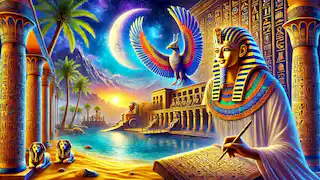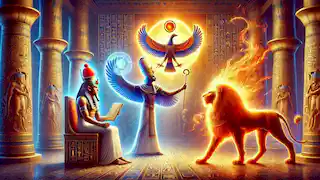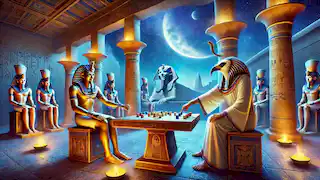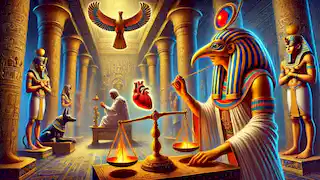The Story of Thoth
Reading Time: 6 min

About Story: The Story of Thoth is a Myth from egypt set in the Ancient. This Descriptive tale explores themes of Wisdom and is suitable for All Ages. It offers Cultural insights. Discover the timeless wisdom and cosmic harmony of Thoth, Egypt's divine scribe.
In the vast pantheon of ancient Egyptian mythology, no deity is as enigmatic, revered, and influential as Thoth. Known as the god of wisdom, writing, and the moon, Thoth was a scribe to the gods, a keeper of sacred knowledge, and a symbol of the balance between chaos and order. His story is not just one of divine feats but a tale that bridges the realms of gods and mortals, intertwining cosmic principles with human understanding. As we journey through the sands of time to explore the life, power, and legacy of Thoth, prepare to uncover the mysteries that have shaped his immortal legend. In the primordial days when the universe was young and teeming with untamed energy, Thoth emerged not from chaos but as a product of balance. Born of Ra’s divine essence and Ma’at’s eternal truth, Thoth's existence was destined to serve as a bridge between cosmic principles. Unlike his peers, who often displayed raw power or primal desires, Thoth was composed, calculating, and imbued with an insatiable thirst for knowledge. The first myth recounts Thoth's role in mediating a dispute between Ra and his rebellious daughter, Sekhmet. As the goddess of war wreaked havoc upon the earth, Thoth crafted words so wise and eloquent that they pacified her wrath. It was here that the other gods first recognized Thoth's unparalleled intellect, and he was appointed as their scribe and the keeper of celestial records. Thoth's affinity with the moon began during a celestial dispute with Khonsu, the moon god. In the myth, the two gods wagered a portion of Khonsu's light in a game of senet, an ancient Egyptian board game. Using his unmatched strategic mind, Thoth won the game and claimed a sliver of moonlight, which he used to create additional days in the calendar. This act not only resolved the tension between Nut and Geb, allowing Nut to give birth to her children, but also established Thoth's dominion over lunar cycles. With the moon as his emblem, Thoth became a deity associated with time and its measurement. The crescent moon symbolized his vigilance over the nights, while the waxing and waning phases mirrored the balance he sought in the universe. Priests and astronomers alike revered him, crediting Thoth with their advancements in timekeeping and the understanding of celestial movements. Before Thoth, knowledge was ephemeral, passed orally from generation to generation. The god's greatest gift to humanity was the invention of hieroglyphic writing. It is said that Thoth observed the patterns of nature—the flight of birds, the ripples in water, and the stars in the sky—and derived symbols to represent thoughts and ideas. The story of his gift to mankind is steeped in altruism. When mortals pleaded with the gods for a means to preserve their wisdom, Thoth descended to the earth and taught them the sacred script. Writing not only allowed for the preservation of laws, rituals, and stories but also strengthened the connection between mortals and the divine. One of Thoth's most critical roles in Egyptian mythology is as a scribe in the Hall of Ma’at. Here, Thoth presided over the Weighing of the Heart, an essential ritual in the afterlife. It was his duty to record the outcome of this test, where a deceased soul’s heart was weighed against the feather of Ma’at, representing truth and justice. If the heart was lighter than the feather, the soul was deemed worthy of entering the Field of Reeds, a paradise of eternal peace. Thoth’s impartiality in judgment made him a symbol of fairness and order. He worked closely with Anubis, the god of embalming and guide of souls, ensuring that no bias marred the process. His precise documentation of each soul’s fate reinforced his reputation as a deity who valued truth above all else. Thoth was often depicted as a man with the head of an ibis or as a baboon, animals associated with intelligence and adaptability. The ibis, with its curved beak resembling the crescent moon, symbolized Thoth’s connection to the lunar cycle. The baboon, on the other hand, represented his role as a mediator and a translator of divine will. These animal forms not only reinforced his attributes but also made him accessible to worshippers. Temples dedicated to Thoth, such as those in Hermopolis, often housed sacred ibises and baboons, which were revered as living embodiments of the god. The story of Thoth is not merely one of divine acts but a narrative of balance. In one lesser-known myth, Thoth is said to have restored harmony between Isis and Set during their conflict over the throne of Egypt. While Isis sought vengeance for Osiris, Set desired power at any cost. Acting as a mediator, Thoth used his wisdom to prevent the realm from descending into chaos. Even in his interactions with mortals, Thoth’s presence was a calming force. Ancient Egyptian scribes and scholars invoked his name before beginning their work, seeking his guidance in achieving clarity and precision. His principles inspired generations to value knowledge, truth, and balance as sacred virtues. As centuries turned into millennia, Thoth’s influence extended beyond Egypt. Greek scholars equated him with Hermes, naming him Hermes Trismegistus, or "Thrice Great Hermes," and credited him with the Hermetic texts that formed the foundation of Western esoteric traditions. Even today, Thoth's legacy persists in the symbols of wisdom and learning. His myths continue to inspire those who seek knowledge and strive for harmony. Whether as a scribe, a mediator, or a celestial architect, Thoth remains an eternal beacon of wisdom, proving that true power lies not in force but in understanding. {{{_04}}} Thoth’s story is a tapestry of divine intelligence, moral clarity, and cosmic order. His influence spans the realms of gods and mortals, touching every aspect of Egyptian civilization and beyond. From the silent glow of the moon to the eternal truths etched in hieroglyphs, Thoth's presence endures as a symbol of balance and enlightenment.The Birth of Wisdom

Keeper of the Moon
The Inventor of Writing

The Judge of the Dead
The Sacred Ibis and Baboon

The Eternal Balance
The Legacy of Thoth
Conclusion

















